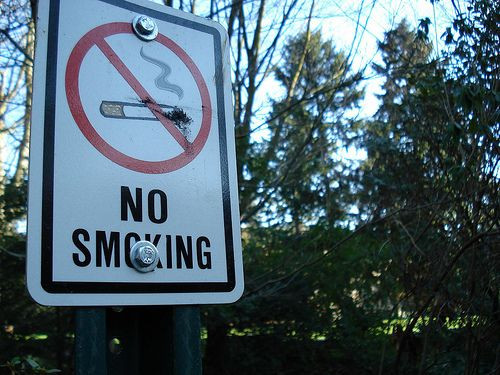Are Outdoor Smoking Bans A Slippery Slope Toward Total Prohibition?

Smokers and non-smokers alike have, by now, generally agreed to the dangers posed by secondhand smoke inhalation. The evidence is manifested in statewide indoor smoking bans, which prevent people from lighting up in schools, bars, restaurants, and public transportation, among others. Less agreed upon are the health effects of inhaling secondhand smoke outside. Disparate scientific opinions now have people questioning, how much regulation is too much?
Framing The Discussion
The debate over outdoor smoking bans has ballooned in recent years, especially as an increasing number of venues institute some form of an outdoor ban. Parks, sports stadiums, public beaches, and college campuses have all enacted bans in some capacity. But as the number of smoking sections dwindles, concern about total prohibition rises. Critics of outdoor bans fear the habit may become stigmatized to the point where legal action relies less on health risks and more on aesthetic.
"The evidence of a risk to people in open-air settings is flimsy," Ronald Bayer, a Columbia University professor, told the Associated Press.
Bayer is among a united front of outdoor ban opponents that believe ban supporters have the wrong intentions in their fight for smoking eradication.
On his side is Simon Chapman, an Australian researcher who was once an ardent anti-smoking supporter, but has now assumed the opposite stance. Chapman has since become the editor of Tobacco Control, “an international peer-reviewed journal for health professionals and others in tobacco control,” according to its website.
Chapman published a 2009 article in the publication’s Debate section, in which he confronts the ethics of outdoor smoking bans, reasoning that they are “ethically unjustifiable.”
“The world is full of people who do not like the ‘aesthetics’ of others' different religions, race, sexual expression, modes of dress, or music,” the article reads. “Too often these doctrines have found expression in paternalistic or downright oppressive regimes. We do not need authoritarian doctrines in tobacco control.”
His main point is that combining health risks with aesthetic portrayals unfairly attacks smokers, in ways that other groups enjoy protection. Smoking should not be portrayed as “desperate, disgusting, and slovenly,” in other words, just because non-smokers have chosen a life without cigarettes. In this regard, Chapman’s argument questions the true risks of outdoor secondhand smoke.
For some, the risks are self-evident.
"If you can smell it, it's obviously there," said James Repace, a Maryland-based scientist-consultant who has done some of the outdoor studies.
Other supporters call into question the validity that “smoke rises,” as one opponent put it — that smoking outdoors allows the carcinogens to dissipate. One study at an Athens, Ga., cafe found the rates of cotinine, a substance produced when the body metabolizes nicotine, spiked in the presence of secondhand smoke.
"There's no risk-free level of secondhand smoke," Brian King, an expert on secondhand smoke with the Centers for Disease Control and Prevention, said to the Associated Press.
Neither Side Backing Down
Unfortunately, the science behind these risks still comes with much controversy.
“Our analysis of the evidence for these claims found it far from definitive and in some cases weak,” Bayer concluded in one study along with his Columbia University colleague Kathleen Bachynski. Both noted that smoking bans in public beaches and parks generally happen for three reasons: the dangers of secondhand smoke, the added waste of cigarette butts, and the poor role models smokers make for children.
The duo’s study found that bans on smoking in parks increased from 0 in 1993 to 843 in 2010. Bans on smoking in public beaches rose from 0 in 1995 to 150 in 2010. The total number has doubled in the last five years, according to the Associated Press, with 2,600 nationwide.
This total has Chapman worried. How far down the slippery slope can smoking bans go before they set dangerous precedents?
"Next you might say 'Let's not just stop there. Let's not have people smoke anywhere they might be seen,'" he said. "And then it is legitimate to say that any behavior that people don't like should be disapproved of because people might see it."



























